Edie Melson's Blog, page 250
January 18, 2019
Has God Breathed Life Into Your Writing?

By Emme Gannon @GannonEmme
In this year of new beginnings, many of us enthusiastically vow to put aside our fears and dream bigger, do better, and accomplish more. Our motives are pure, but statistics tell the sad news that 80% of our New Year’s resolutions fall apart by February. Schedules interfere with production. Deadlines produce panic. Life’s uncertainties pull us off course. Putting our name to our words is a big deal and we feel the pressure even after we push send. Performance anxiety runs high among writers. Especially if we forget who we’re writing for. And why. We can easily get so caught up in our projects that we no long give God reign over that to which He has called us.
Our words are sacred, but only if God has breathed life into them. In the very beginning, God created the world with His Word. He spoke and matter joined together and miraculously created an incredibly beautiful world with sun and moon, sunsets, sunrises, plants, trees, rivers and seas, sea creatures, birds of the air, and beasts of the earth. Then God scooped dust from the earth and molded man, creating him in the image of Himself. Newly created man lay lifeless. And then something amazing happened. God breathed into the man’s nostrils the breath of life. The very breath of God entered into Adam and he became a living being. Wisdom, energy, and spirit surged into the man with his newly beating heart.
Each time we breathe, we are breathing the breath of God, passed down from our ancestor Adam. When we yield to God’s assignments for us, our writing takes on new energy and crashes through invisible walls with power to bring life where there was none—words that allow the Holy Spirit to stir our reader’s soul and renew their minds to God’s truth.
This is my prayer for each of you in this new year—that the word that God had placed in you so very long ago will be rekindled in your mind and heart. That you will see it with eyes of faith—faith that will allow the breath of God into that new thing. Words of life that have purpose and power to change the hearts of those who read your words. I pray you’ll be brave enough to lay aside that which God has for another time. Words He is not ready to breathe His life into. Words that have purpose and power but are for another time. Trust that any rejections are God’s way of guiding you into greatness, into the path of God-breathed writing.
“For I am about to do something new. See, I have already begun! Do you not see it? I will make a pathway through the wilderness. I will create rivers in the dry wasteland.” Isaiah 43
Happy New Year, dear writers. May this year bring God-breathed words that touch a hurting world and create new life.
TWEETABLE
Has God Breathed Life Into Your Writing? @GannonEmme on @EdieMelson (Click to Tweet)
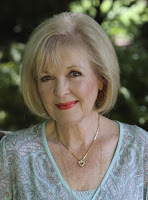 Emme Gannon is a wife, mother, and grandmother who loves to write stories that stir the heart. Her award-winning writing has appeared in Focus on the Family magazine, several anthologies, and numerous newsletters. She just completed her first novel.
Emme Gannon is a wife, mother, and grandmother who loves to write stories that stir the heart. Her award-winning writing has appeared in Focus on the Family magazine, several anthologies, and numerous newsletters. She just completed her first novel.
Published on January 18, 2019 22:00
January 17, 2019
Answers to Some of the Questions Authors Ask—Help Pirates!
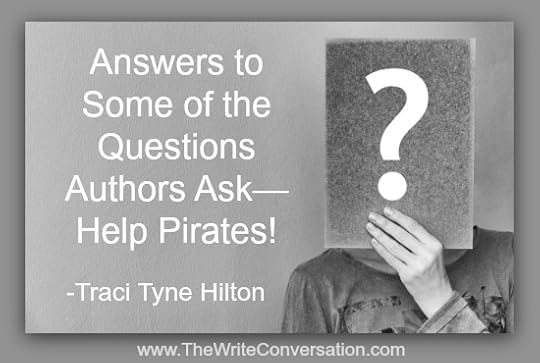
by Traci Tyne Hilton @TraciTyneHilton
#4 In a series where I answer questions I suspect you are asking
Indie Author:I’ve been robbed! Google told me my book is free on a site and I KNOW that’s where all of my sales are going! I would have been rich if it hadn’t been for this site stealing my intellectual property! What can I do? How do I fix it? Is all hope gone? Can I sue them? Can I call the police? Can I speak to the manager?
Deep breath.
It’s going to be okay.To be honest, only 1% of all authors get rich in the first place, so don’t worry about that.
Also, I have a strong feeling that the “site” giving your book away for free, is actually just trying to give someone else a computer virus. Please don’t click attempt to download the file to prove it is real.
That said, maybe you already checked, and you didn’t get a virus…you actually got your book. That can feel pretty gross. Devastating, even. But before you give in to despair consider these three things:
1. You, who know your web presence like the back of your hand, didn’t know that book was on that site. What are the odds your readers know about that site? Slim.
2. You, who know your sales like the back of your hand, are well aware of the difference in sales between say, your Kobo listing and your Amazon listing. Would you go broke without Kobo? I doubt it. You won’t go broke because of this site, either.
3. Amazon, who knows more about you than you are comfortable with, also tracks your books. When they find your book at a legitimate store for free, they will price match it. They will not be beat on low prices. Has Amazon price matched your book? Then the place you found it isn’t doing the kind of damage to your sales that makes Amazon care. So, you shouldn’t care either.
In the year 2ooo Metallica took Napster to court for piracy. Metallica won.
Fans were crazy mad. Fans had made Metallica famous by pirating their music onto cassette tapes and sharing it with friends. Without piracy, Metallica wouldn’t have had the money to take Napster to court. I don’t endorse stealing in any kind, so please don’t take this story of Metallica as an endorsement of piracy but consider the value instead of your book in more readers hands. If you follow any of my advice than you already discount books, advertise books and give books away. If you happen to be on a real piracy site that has real readers who are finding your book, you might consider looking at it as free advertising. Instead of thinking about the price per book you might be losing, you can think about the price per ad you are saving. Metallica didn’t think about the money they were losing when fans shared their early work. And it made them famous.
All of that said, if your book is being pirated on a legitimate site and you really want it removed that, check out https://kindlepreneur.com/ebook-piracy/ which has great step by step directions to take care of the problem
TWEETABLE
Answers to Some of the Questions Authors Ask—Help Pirates! @TraciTyneHilton on @EdieMelson (Click to Tweet)
Piracy and publishing go hand-in-hand, but it's not always a big deal - thoughts from @TraciTyneHilton on @EdieMelson (Click to Tweet)
Other Posts in This Series
Answers to Some of the Questions Authors Ask—What If I Can't Do It? (Part 1)
Answers to Some of the Questions Authors Ask—Aren’t All Indie Books Bad? (Part 2)
Answers to Some of the Questions Authors Ask—But Everyone Else is Cheating, Why Can’t I? (Part 3)
Answers to Some of the Questions Authors Ask—Help Pirates! (Part 4)
 Traci Tyne Hilton is the author of The Plain Jane Mysteries, The Mitzy Neuhaus Mysteries and the Tillgiven RomanticMysteries. Traci has a degree in history from Portland State University and still lives in the rainiest part of the Pacific Northwest with her husband the mandolin playing funeral director, two busy kids, and their dogs, Dr. Watson and Archie Goodwin.
Traci Tyne Hilton is the author of The Plain Jane Mysteries, The Mitzy Neuhaus Mysteries and the Tillgiven RomanticMysteries. Traci has a degree in history from Portland State University and still lives in the rainiest part of the Pacific Northwest with her husband the mandolin playing funeral director, two busy kids, and their dogs, Dr. Watson and Archie Goodwin.More of Traci’s work can be found at www.tracihilton.com
Published on January 17, 2019 22:00
January 16, 2019
Have You Entered the WRITING ZONE?
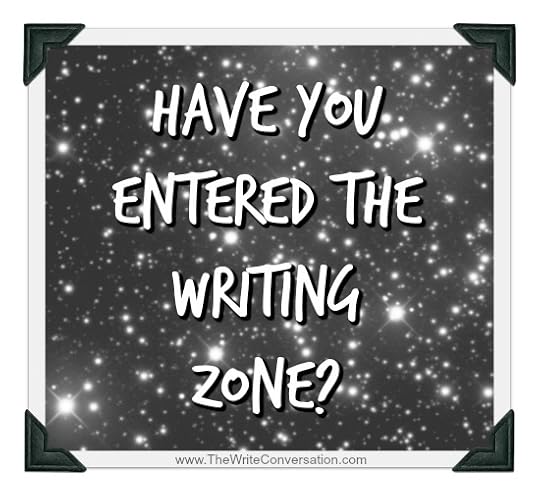 by Edie Melson @EdieMelson
by Edie Melson @EdieMelsonThere is a fifth dimension beyond that which is known to man. It is a dimension as vast as space and as timeless as infinity. It is the middle ground between light and shadow, between science and superstition, and it lies between the pit of man's fears and the summit of his knowledge. This is the dimension of imagination. It is an area which we call THE WRITING ZONE.
Okay, I confess. I borrowed the intro from a television cult classic. But truthfully, have you ever read a better explanation of what it means to be a writer?
Today I’m offering some tips to help you find your way to the writing zone.
1. Be Willing to Call Yourself a Writer: Yes, this one is controversial. There are many who argue that we must do much more than just call ourselves a writer to become a writer. I would only say this, I believe that calling yourself a writer is the first step on becoming a writer. Without that step, it’s hard to move forward.
2. Spend time Writing: This may seem like a no-brainer, but spending time talking about writing—as opposed to actually writing is fairly common. Don’t be one of those who only dream, be ready to walk through to The Writing Zone by spending time writing.
3. Invest Financially in Your Writing:Take classes, attend conferences, buy books, join organizations. Do your homework first, but be ready to put your money where your pen is. Here’s a series of posts I wrote about Dollars & Sense for Writers.
4. Develop the Art of Patience & Enjoy the Journey: Finding success in publishing rarely happens overnight. Realize that you’re in it for the long hall and do the next thing. Relax and enjoy the journey, but keep moving forward.
5. Make Writing a Priority: In the beginning, it’s hard for some friends and family to understand the commitment it takes to become a writer. Beginning writers don’t often get paid for writing and it’s easy to assume it’s a hobby. For some writing is a hobby, and that’s fine. But if you’re serious, then act like it. If you don’t take writing seriously, then no one else will.
6. Realize that Failure is an Option—a Good One: We often learn more when we fail. If we never experience failure, it’s a sign that we’ve never tried anything difficult.
7. Talent is a Very Small Part of the Equation: Talent won’t take you far. Diligence and perseverance are where you find the strength for The Writing Zone.
8. Don’t Try to Go It Alone: While writing is a mainly solitary pursuit, we still need others to help us. We need to be a part of a writing community so we can give and receive encouragement and get perspective on what we write.
9. Don’t Kill Your Creativity with Negative Self-Talk: We all do it. But talking down to ourselves will have a negative impact.
10. Comparison is a Death Trap for Writes: It’s easy to look at others and think we’re gaining perspective. The truth is, we aren’t. Everyone’s writing journey looks different. This isn’t a one-size-fits-all endeavor.
11. Keep the Faith: There is a reason you started on this journey. Write it down and put it where you can see it. I believe God made me as a person who processes life through words. If I tried to give up writing, I truly think I’d die.
These are the things that have helped me find my way to The Writing Zone. What would you add to the list? Be sure to leave your thoughts in the comments section below.
Don't forget to join the conversation!Blessings,Edie
TWEETABLESThe Writing Zone is a lot like The Twilight Zone - thoughts from @EdieMelson (Click to Tweet)
Have You Entered THE WRITING ZONE? - via @EdieMelson (Click to Tweet)
Published on January 16, 2019 22:00
January 15, 2019
Map Out Your Blogging Calendar with These 10 Tips
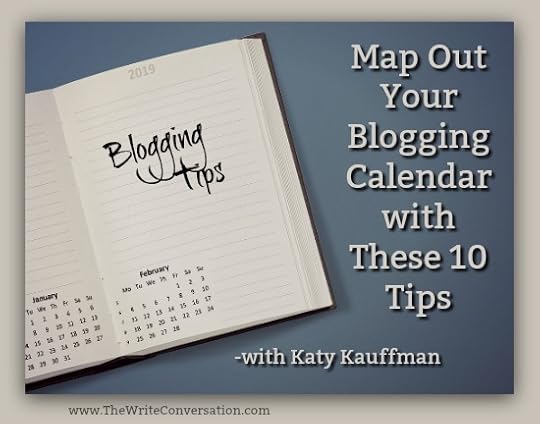
by Katy Kauffman @KatyKauffman28
A new year means 52 new blog posts for us who are weekly bloggers. Some writers may be more adventurous and post more often, but I’ve found I need to blog just once a week to keep up with my schedule of writing, editing, and marketing. (If you can blog more, like Edie, I am rooting you on!)
When I plan what to write for my blog, I don’t worry about the number 52. Fifty-two posts is a lot to plan at one time. I focus more on the number 3. What can I write about in the next 3 months?Some weeks will have obvious topics—celebrating a birthday or a book release, remembering fallen heroes and the birth of our nation, and honoring the Lord at Christmas and Easter. For all of the other weeks, I’d like to give you some steps for filling in your blogging calendar. I use a weekly/monthly planner to keep up with my blogging topics. Although I write down everything going on in my schedule in this calendar, I put brackets around my blog topic to help it stand out. So in each Tuesday’s box in my calendar, I see brackets around my blog topic and who is writing it. (Recruiting guest bloggers is a great idea that I’ll talk about a little later.)
10 Steps to Mapping Out Your Blogging Calendar: Write down holiday posts on the appropriate weeks, and fill in other meaningful dates.Pray about a series.I like these because I know what I’ll be writing about for weeks at a time. Pray about a subject and write down ideas for posts once you know your topic. Fill in your calendar based on the number of weeks you need.Plan “random” posts.I recommend giving yourself 3-4 weeks in between series for this type of post. This will let your brain rest and be creative with spontaneous ideas.Recruit guest bloggers. I especially need this while I am designing magazines, but it’s a good idea for anyone. Featuring guest bloggers gives you time to rest, and it gives your guests a new or broader audience. I try to have only two guest bloggers in a row since I write weekly and want to stay in touch with my readers. If you plan a series for your blog, consider asking trusted writers to join you. It will likely prove to be a lot of fun.Write about asermon series. If you know that your pastor is planning one, give yourself one or two weeks to talk about something from his series. Give him credit in the post(s), and use at least one quote from his sermons.Remember your travels.If you are taking a trip, plan a week afterthe adventure to write about it. Remember to take good pictures while you are gone, and share something that God showed you or a special moment that you relished with your fellow travelers.Schedule a book or movie review, perhaps once a quarter. A great network of bloggers who review books and hold giveaways is the Blog Spot Network (also known as BlogAbouton Facebook), run by the Blythe Daniel Agency. I’ve enjoyed being a part of this network as I share my reviews with readers. Promoting the books with a giveaway is even more fun, and perhaps the best part of the arrangement is that reviewers receive a copy of the book to keep. (I’ve even reviewed a leather Bible.) Keep past posts handy.If you know a certain time of the year will be extremely busy, plan to share a popular post that is six months or a year old. Change the picture and update any wording you need to. Also, this is helpful when you have an emergency and don’t have time to write something new.Blog about writers conferences. If other writers are a big part of your audience, plan a few posts at the appropriate times of the year. Many conferences happen in the spring and fall, and if you’ve been to one before, you have some wisdom to share with “newbies” or some good memories to pass on to veterans.Keep your eyes open.Not just your physical eyes, but your spiritual eyes. Some of the best blog posts I’ve written were gifts from God—a yellow butterfly with broken wings in the backyard, a crepe myrtle branch who became a tree, a sunset that caused me to sing “Midnight Cry” in the car. Although you can’t “plan” for these things to happen, you can give yourself room in your calendar to capture the tiny, the magnificent, and the unexpected in words.What tips can you offer for mapping out a blogging calendar? What ideas have worked for you in the past? Share your thoughts, and don’t forget to join the conversation!
TWEETABLESMap Out Your Blogging Calendar with These 10 Tips from @KatyKauffman28 on @EdieMelson (Click to Tweet)
Don't get caught without a post - tips to fill your #blogging calendar @KatyKauffman28 on @EdieMelson (Click to Tweet)
 Katy Kauffman is an award-winning author and a co-founder of Lighthouse Bible Studies, a ministry which seeks to connect people to God through His Word.
Katy Kauffman is an award-winning author and a co-founder of Lighthouse Bible Studies, a ministry which seeks to connect people to God through His Word.
She has taught the Bible to women and teens, and has two published Bible studies for women, 2 Timothy: Winning the Victory and Faith, Courage, and Victory which won the 2016 Selah award for Bible studies. She is an editor of Refresh Bible Study Magazine and the designer of Broken but Priceless: The Magazine. She makes her home near Atlanta, Georgia.
Published on January 15, 2019 22:00
January 14, 2019
Develop the Right Tools to be a Successful Writer

by Edie Melson @EdieMelson
As writers, we’re warned early on to avoid the trap of comparison. Each of us has a different path to success—and a different path to publication. These varying ways of living life as a writer aren’t good and bad or even better and best—they’re just different.
Today I want to encourage you to do just the opposite.While we shouldn’t judge our value as writers by looking at one another. There are some comparisons that can make a difference between fulfilling our dreams or losing heart and quitting when success is just around the corner. These are some key differences between successful and unsuccessful writers.
The Differences Between Successful & Unsuccessful Writers1. Goals vs. WishesA successful writer sets goals.An unsuccessful writer makes wishes.
2. Striving vs. ComplacencyA successful writer finds others who are further along on the writing journey and strives to catch up.An unsuccessful writer finds others who are further behind on the writing journey and relishes being ahead.
3. Taking Responsibility vs. WhiningA successful writer takes responsibility for making the dream happen.An unsuccessful writer whines about all the reasons the dream will never happen.
4. Acting vs. TalkingA successful writer invests time, energy and money in learning how to write better.An unsuccessful writer talks about writing better.
5. Belief vs. UnbeliefA successful writer believes in her dream.An unsuccessful writer believes it will never happen to her.
6. Positive Companions vs. Negative CompanionsA successful writer surrounds himself with others who are willing to pay the price for success.An unsuccessful writer hangs out with others who make excuses for not attaining their dreams.
7. Talks About Ideas vs. Talks About PeopleA successful writer talks about ideas.An unsuccessful writer talks about other writers.
8. Takes Responsibility vs. Places BlameA successful writer takes responsibilities for failures.An unsuccessful writer looks for others to blame for failure.
9. Rejoices in the Success of Others vs. Rejoices in the Failure of OthersA successful writer takes joy in the success of others.An unsuccessful writer takes joy in the failure of others.
10. Embraces Change vs. Avoids ChangeA successful writer looks for ways to embrace change.An unsuccessful writer looks for ways to avoid change.
11. Afraid of Mistakes vs. Afraid of TryingA successful writer isn’t afraid to try something difficult and make mistakes.An unsuccessful writer believes that not making a mistake is better than ever trying at all.
And ultimately...
12. Keeps Trying vs. Gives UpA successful writer never gives up.An unsuccessful writer quits when things get tough.
This is my list. What would you add?
Don't forget to join the conversation!Blessings,Edie
TWEETABLESDevelop the Right Tools to be a Successful Writer - @EdieMelson (Click to Tweet)
The differences between successful writers & unsuccessful writers - @EdieMelson (Click to Tweet)
Published on January 14, 2019 22:00
January 13, 2019
How a Writer Can Put Power into a Point: Part 2
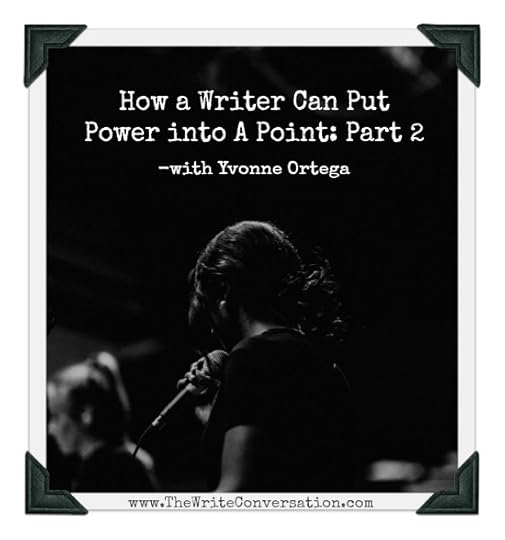 by Yvonne Ortega @YvonneOrtega1
by Yvonne Ortega @YvonneOrtega1Here is the link to Part 1 of How a Writer Can Put Power into a Point , it appeared on the Write Conversation Monday, December 10, 2018. Here are the main points from it: Speak in a Conversational Manner Don’t Read Your SlidesKeep Your Slides Simple
Now let’s go into Part 2.
Face Your AudienceLook at your audience. Imagine how you would feel if your audience had their behind to you for most of your presentation. With that in mind, don’t read from the screen with your back to the audience.
If you need to read one or two of your slides, stand to the side of the screen.
Remember your audience came to see you, not your slides. Face your audience to connect with them. Be PreparedBe so well prepared that should the technological equipment fail to function, you can go on without the slides.
I spoke at a women’s retreat where the power did go off on the second day. With my preparation of an outline and brief notes, I continued without the projector.
Stay away from the Projector’s GlareWhen you speak, don’t block the screen. You don’t want the glare on your face. It does nothing to improve your looks. It ages you.
When you don’t need your slides, turn the projector off with a media remote control if one is available. If one isn’t, turn it off yourself or have someone do it for you.
Before your presentation, ask if the other person knows how to turn off the projector. If he/she does, that’s great. If not, give the person the opportunity to practice ahead of time.
At the end of a presentation I attended, eight women stood in front of the projector to have their picture taken. No one had turned off the projector. They had the glare on their faces for all the pictures.
Use an Electronic Pointer Avoid the temptation to place your index finger on the screen to point to text on the slides. Newer models of media remote controls will have a pointer on them. Use the electronic pointer. If yours doesn’t have one, present the content without pointing.
An author made a DVD of her presentation. Although she had excellent content, she pointed on the screen with her index finger throughout the presentation. I found it distracting. Her audience may have too.
Furthermore, she blocked the view of the audience every time she pointed with her index finger. When the DVD showed the men and women in the audience, I could see them leaning to the right or to the left to see the screen.
Avoid Chemicals, Perfumes and Other Strong OdorsMany people suffer from allergies or asthma. As presenters, we want to do what we can to eliminate toxins that trigger allergies or asthma in our attendees.
Everyone in our audience deserves a healthy, safe environment.
Prior to my awareness and purchase of the Expo low odor dry erase markers, I wouldn’t use dry erase markers. I didn’t want to be responsible for someone in my audience going to the emergency room because of an allergy or asthma attack.
Use HumorWhen you speak on a heavy topic or give a lengthy presentation, break up the tension with humor. Please don’t insert a string of jokes that have nothing to do with your topic.
You can use an example from your own life or something that happens during your speaking engagement. For example, during an hour and a half presentation, I tripped over the cord on the microphone. I laughed at myself and said, “My name is not Grace.” The audience laughed with me.
We laughed harder when I tripped over the cord a second time.
You may find a cartoon online or a sign in your everyday life that enhances your presentation. Have your cell phone ready to take pictures. If your topic is self-editing, you’ll find countless billboards that will provide humor for your presentation.
To wrap up, here are the main points again:Face your audience.Be prepared.Stay away from the projector’s glare.Use an electronic pointer.Avoid chemicals, perfumes and other strong odors.Use humor.
Follow those guidelines along with the ones in Part 1 for a successful PowerPoint session.
TWEETABLES
How a Writer Can Put Power into a Point: Part 2 - @YvonneOrtega1 on @EdieMelson (Click to Tweet)
Following these guidelines can help any writer put together a powerful PowerPoint session - @YvonneOrtega1 on @EdieMelson (Click to Tweet)
 Yvonne Ortega speaks with honesty and humor as she shares her life and struggles through presentations that help women find comfort, peace, and purpose. Her background as a licensed professional counselor gives her a unique perspective into the heart of women. Her counseling experiences in jails, prisons, and outpatient services add depth and humor to her presentations, as do her years of teaching mostly high school and college Spanish. Her presentations are interactive and down-to- earth with application for the audience from God’s Word and his promises.
Yvonne Ortega speaks with honesty and humor as she shares her life and struggles through presentations that help women find comfort, peace, and purpose. Her background as a licensed professional counselor gives her a unique perspective into the heart of women. Her counseling experiences in jails, prisons, and outpatient services add depth and humor to her presentations, as do her years of teaching mostly high school and college Spanish. Her presentations are interactive and down-to- earth with application for the audience from God’s Word and his promises. Yvonne is also a speaking and writing coach and the owner of Moving from Broken to Beautiful®, LLC. She is the author of four books: Finding Hope for Your Journey through Breast Cancer, Moving from Broken to Beautiful: 9 Life Lessons to Help You Move Forward, Moving from Broken to Beautiful® through Forgiveness, and Moving from Broken to Beautiful® through Grief.
Yvonne is a member of the Advanced Writers and Speakers Association (AWSA), the Christian Authors Network (CAN), the National Speakers Association (NSA), and Toastmasters International.
Published on January 13, 2019 22:00
January 12, 2019
Am I Content to Follow God—No Matter What?
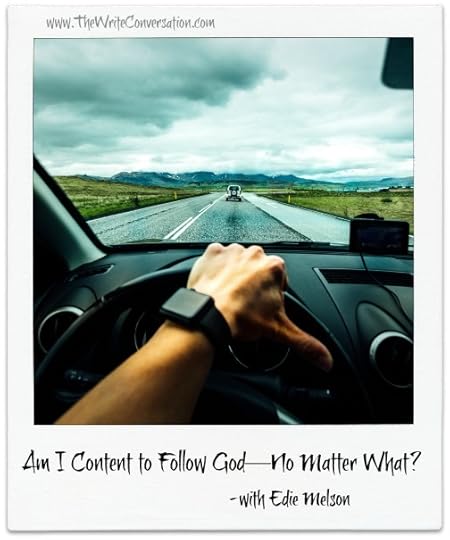
Commit your way to the Lord, trust in Him and He will do this. Psalm 37:5
A few summers ago, a group of us drove to the beach. We took several cars and, although I’d never been to that particular beach, I agreed to drive. Things were a little crazy when we left and, after we got on the road, I realized I hadn’t gotten written directions, or even the address to plug into my phone.
The car I was following was driven by a close friend, and I knew she could get us there, no problem, but it still made me a little nervous.
I was careful to keep her car constantly in sight, and stay alert to any signs that she planned to change direction. I had to rely on her to get me safely to our destination.
While I groused about not knowing exactly where I was going, it hit me that my life with God was like that trip. As a believer, I know that my ultimate destination is Heaven, but I have no idea what path my journey between here and there is going to take. But just like the trip to the beach, I must follow God closely to stay on the right path. I have to stay alert, look for His directions and not get separated.
Not easy for a girl with control issues.
It’s hard for me in a lot of ways, but especially when it comes to my writing career. When I started this path, I had a very clear picture of what my life as a writer would look like. I knew the things I’d be doing, the things I’d concentrate on and how it would lead me to success.
Make that my version of success.
The plans made perfect sense. They were reasonable and attainable. I was so certain about where I was headed, I even ran ahead of God. And I learned it does us no good to get ahead of God, only He knows the correct path for each of us. Because very little of what I had planned has happened.
I have become a full time writer, but my path has been very different from what I’d imagined and infinitely better!
I discovered early on that my God is a BIG God and He has plans to bless us beyond anything we could hope or imagine.
As I’ve learned to relinquish control to God, He’s taken me down paths I hadn’t dared dream about. I’m here to say I’m not the one in control, God is, and I’ve learned to trust that He knows the best way to get where we’re going.
What about you—are you following or trying to anticipate what comes next? Take a deep breath and relax. God's got this.
TWEETABLE
Am I Content to Follow God—No Matter What? @EdieMelson (Click to Tweet)
Published on January 12, 2019 22:00
January 11, 2019
Making Changes
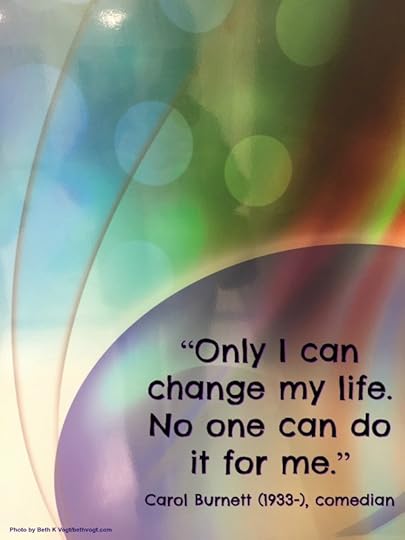
by Beth Vogt @BethVogt
Some quotes you just can't argue with. I could leave it at that and this would be a very short blog post, wouldn't it?
Yep. Feeling a bit sassy today.
Expounding on the whole "making changes" theme:People in my life can influence me so that I see the need to change. People can inspire me by the changes they've made in their lives so that I want to do what they did and change, too. People can even confront me and tell me I should change. Demand that I change.
But only I can change my life. It's as simple, and as hard, as that.
Realizing that I'm responsible for the change in my life—or the lack of any change—is a sure sign of growing up, wouldn't you agree?You can't blame someone else for who you are, who you're becoming, or what you do or don't do.
Now for me, because I'm on a faith journey with God, there's also a spiritual element to this "only I can change my life" principle.Because sometimes ... sometimes I tell God "I can't" and He tells me "I know." And His words are bathed in grace and love. And I'm reminded that some life changes—the best life changes—are miraculous.
What produces change in your life? What's been one of the biggest changes in your life? Or even one of the smallest, but it had the most sweeping effect on you?
TWEETABLEOnly I can change my life - thoughts on making changes from author @BethVogt on @EdieMelson (Click to Tweet)
 Award-winning author Beth K. Vogt believes God’s best often waits behind the doors marked “Never.” Having authored nine contemporary romance novels and novellas, Beth's first women's fiction novel with Tyndale House Publishers, Things I Never Told You, released May 2018. Moments We Forget, book two in the Thatcher Sisters Series, releases May 2019. An established magazine writer and former editor of the leadership magazine for MOPS International, Beth blogs for Novel Rocket and The Write Conversation and also enjoys speaking to writers group and mentoring other writers. Visit Beth at bethvogt.com.
Award-winning author Beth K. Vogt believes God’s best often waits behind the doors marked “Never.” Having authored nine contemporary romance novels and novellas, Beth's first women's fiction novel with Tyndale House Publishers, Things I Never Told You, released May 2018. Moments We Forget, book two in the Thatcher Sisters Series, releases May 2019. An established magazine writer and former editor of the leadership magazine for MOPS International, Beth blogs for Novel Rocket and The Write Conversation and also enjoys speaking to writers group and mentoring other writers. Visit Beth at bethvogt.com.
Published on January 11, 2019 22:00
January 10, 2019
You Have a Great Scene, But What to Do With It?

by Marcia Moston @MarciaMoston
I’m sitting in a sterile hospital room with my husband. He’s here to find out the impact genes, age, and eating habits (I won’t discuss all those fast food and Dunkin’ Donuts wrappers I find in his truck) has had on his heart and arteries. A nurse enters and instructs him to take everything off and put on the blue-print dressing gown folded on the bed. “It opens in the back,” she says. Bob starts to undress. He understands her directive conveys another message: from this point on he will relinquish his right to privacy, what he usually keeps covered will now be laid bare. After he’s wheeled off to surgery, I go to the cafeteria, buy a coffee and sit. It’s early and the place isn’t busy. Several computer-carrying Starbucks aficionados wearing jeans and untucked shirts chat with each other as they wait in line. A trio of hospital workers in green scrubs enters. They’re singular in purpose—purchase their drinks and leave as quickly as they came. I note how straight the woman a few tables down from me sits as she works on her computer and automatically sit straighter in my chair. The woman is fiercely stylish with her slick dark hair and big bold glasses. The leopard lining of her coat matches her leopard heels.
Movement at the entrance of the cafeteria catches my attention. A man shuffles in pulling the IV pole he’s attached to alongside. Skinny bare legs protrude from the hem of his hospital gown, a gown like the one my husband has, a gown I know opens in the back. He comes my way. I think it brave of him to want something (he too is headed toward Starbucks) so much that he’s willing to expose his vulnerability, to shed the image his street clothes would normally provide and show up instead in a flimsy cotton gown. But how much is he willing to expose? I have to know.
As he passes inches from my table, I turn and look. Although it would have made a far more spectacular ending had it been otherwise, I am relieved to glimpse a pair of black gym shorts under the slit in the gown.
That is the scene that’s hunkered down in my mind for the past few days. I want to use it to illustrate something for my long-overdue post. The question is—what?
So often nonfiction writers, in particular, come up with a theme or point they want to make and then scramble for the illustration. The benefit of this approach is the initial clear direction and order. The danger is the potential for tacking on a contrived example that is forced into supporting a weight it wasn’t meant to bear.
But the same challenge exists for those of us who start out with an idea, image or scene without knowing where it is going. Just because something happened doesn’t make it meaningful. We can continue writing in hopes the story or truth will emerge like a mastodon tooth from a melting block of ice. We can cut the darling scene loose and start anew. Or we can call a critique friend for advice.
Initially I came up with three possible directions from my scene:Exposing ourselves in our writing—how much, how little? How will the reader know if we’re holding back? (This idea played off the hospital gowns at the beginning and end and the general sense of vulnerability being in a hospital brings. It would probably appeal most to memoirists and people writing hard stories.)The part clothing plays in revealing much about our characters (and selves). How we can use it to explore status, position, and attitude. (I thought this would be a fun topic and it fit with both images—the robed people and the ones in the cafeteria.) Satisfying endings versus downer endings—when the psychological or surprise twist works and when you wished you hadn’t stayed up all night reading only to find out it didn’t. (Inspired by the anticipation of seeing what was at the end of the man with the IV approaching me. The frustrating ending of the psychological thriller I just finished also contributed.)
Unable to decide, I asked the advice of my three critique partners. Great supporters that they are, they promptly responded—each with a different answer. One suggested I explore my dilemma—what should a writer do when she has a great scene but doesn’t know where to go with it.
And so I did but now ask you. Which approach do you use? What do you do when the story or truth or theme is slow to emerge but the scene refuses to go away? And—which of the above possible topics best fits my scene?
***As for my husband, it turns out that the donuts have done their damage and he will return to don the gown and face major surgery, after which, we’ve been told, he’ll feel like a new man. May it be so.
TWEETABLEYou Have a Great Scene, But What to Do With It? Thoughts from @MarciaMoston on @EdieMelson (Click to Tweet)
 Marcia Moston—author of the award-winning Call of a Coward-The God of Moses and the Middle-class Housewife—has written columns and features for several magazines and newspapers. She has served on the faculty of the Blue Ridge Mountains Christian Writers Conference and currently teaches her true love—memoir and creative nonfiction—at the Osher Lifelong Learning Institute on the Furman campus in South Carolina.
Marcia Moston—author of the award-winning Call of a Coward-The God of Moses and the Middle-class Housewife—has written columns and features for several magazines and newspapers. She has served on the faculty of the Blue Ridge Mountains Christian Writers Conference and currently teaches her true love—memoir and creative nonfiction—at the Osher Lifelong Learning Institute on the Furman campus in South Carolina.
Published on January 10, 2019 22:00
January 9, 2019
7 Tips to Make You a More Observant Writer
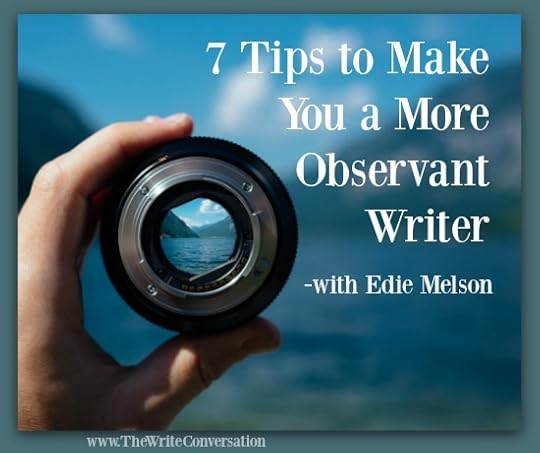
by Edie Melson @EdieMelson
By and large writers are an observant lot. Things others might brush over or miss entirely stay with us, sparking ideas that blossom and grow. An overheard conversation can lead us to the plot of entire book.
But like any skill that comes naturally, there's still room for improvement. I call it focusing the writer’s eye. Today I want to give you seven tips to help you focus your writer's eye.
But like any skill that comes naturally, there's still room for improvement. I call it focusing the writer’s eye. Today I want to give you seven tips to help you focus your writer's eye.
Tips to Hone Your Observation Skills
1. Stop hearing, and take time to listen. The world around us is filled with words. So much so that it becomes a kind of white noise. As writers we need to be able to pick out the bits and pieces that resonate with the souls of our audience.
2. Search out the music. The spoken word can have a lyrical quality. As writers it’s our job to capture that music on a page. Develop an ear for the cadence in words and sentences.
3. Take what’s being said—not what’s meant—and follow it an unexpected end. For example, I overheard someone talk about another person’s downfail. No that’s not a typo, I meant to write DOWNFAIL. From the context, I know he meant to use the word, DOWNFALL. But that lead me to a cool devotion on the difference between the two concepts.
4. Paint a picture . . . with words. Look at something that intrigues you, or inspires you, and recreate it in words. Try to boil it down to the essence in a way that others can experience what you did.
5. Expand your horizons. I’ve heard it said that the English language is limiting because it’s not a large language. There just aren’t as many words as in other languages. That may be true, but while the average adult is said to have a vocabulary of between 20,000 – 30,000 words, they probably only use about 5000. As writers, we need to strive to be above average. As a matter of fact, it’s my opinion we should set standard.
6. Stretch your creative muscles. Along with number 5 above, don’t just stick with what you know and do well. Stretch yourself by venturing beyond your comfort zone. If your chosen field is fiction, try writing poetry. If you are most comfortable with non-fiction, give writing short stories a try. You may not choose to add that skill to your repertoire, but what you do write will be richer because you branched out.
7. Practice, practice, practice. It doesn’t matter what discipline, every artist will tell you it takes time to become proficient with your medium. This is just as true with words. Get familiar with your medium. Take time to learn the nuances, master the graceful ins and outs of language.
What are some things you do to help you see the world around you in such a way that you can capture it on the page? Share your own tips here. Also, I’d like to issue a challenge. Take one of the above points and practice it every day for a week. Then, next Friday, report back and let’s share what we’ve learned. I’ll do it too.
And don’t forget to join the conversation!Blessings,Edie
TWEETABLESCapturing the world in words—7 Tips to Make You a More Observant Writer – @EdieMelson (Click to Tweet)
Tips to help you focus your writer’s eye via @EdieMelson (Click to Tweet)
Published on January 09, 2019 22:00



